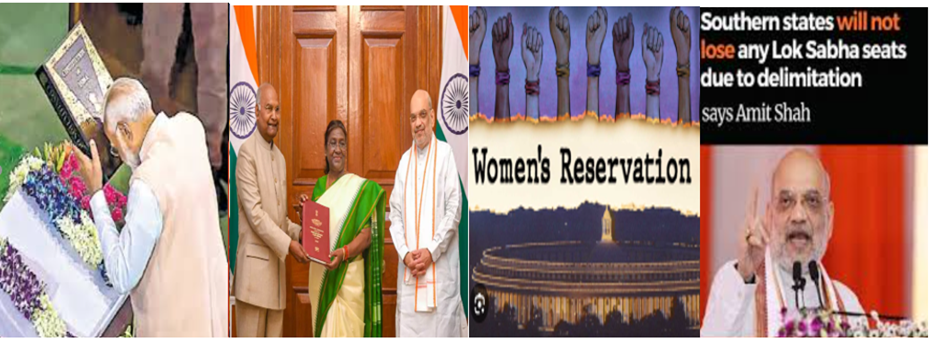A paradigm shift and audacious reforms to upend Bharat democracy’s status quo
The Bharat democratic process is at a critical juncture, with discussions around three transformative reforms—One Nation, One Election, delimitation, and women’s reservation—gaining momentum. If implemented effectively, these changes could revolutionize governance, ensure inclusivity, and enhance efficiency in India’s electoral framework. The Modi government is truly upholding constitutional values and the spirit of democracy in the truest sense with these reforms. These measures are not merely administrative changes; they are bold moves to strengthen the democratic framework, ensuring fairness, representation, and inclusive participation.
One Nation, One Election: Enhancing Governance Efficiency
The idea of simultaneous elections for the Lok Sabha and state assemblies has been debated for decades. Advocates argue that frequent elections disrupt governance, burden the exchequer, and lead to policy paralysis due to the Model Code of Conduct being imposed repeatedly. Conducting all elections in a synchronized manner would not only reduce expenditure but also allow governments to focus on long-term policy implementation without electoral distractions. However, challenges such as logistical feasibility, constitutional amendments, and political consensus must be addressed before transitioning to this model.
Delimitation: Balancing Representation and Demographic Realities
Delimitation, or the redrawing of electoral constituencies based on population shifts, is crucial for maintaining equitable representation. The current freeze on delimitation, imposed in 1976 to ensure balanced regional development, has led to a disparity in representation, with states that have successfully controlled population growth losing out in terms of parliamentary seats. A fresh delimitation exercise, while necessary for reflecting demographic changes, must be carried out judiciously to maintain federal harmony and address concerns of regional disparities. The Modi government’s commitment to fair representation through delimitation reflects its dedication to the constitutional ideal of equal representation for all citizens.
Women’s Reservation: Fostering Gender Inclusivity in Politics
The long-awaited Women’s Reservation Bill, ensuring 33% representation for women in legislatures, is a monumental step towards gender inclusivity. Despite comprising nearly half of India’s population, women remain grossly underrepresented in law-making bodies. This reservation will empower women, encourage greater political participation, and bring diverse perspectives to governance. For effective implementation, political parties must also ensure women’s leadership roles extend beyond symbolic representation, leading to substantive policy contributions. The Modi government’s commitment to gender parity showcases its resolve to create an inclusive democracy.
A Roadmap for Implementation
While these reforms promise efficiency and inclusivity, their execution requires meticulous planning. Constitutional amendments, bipartisan political consensus, and public engagement will be critical. A phased approach, along with pilot programs for One Nation, One Election, and delimitation reforms, can smoothen the transition. Women’s reservation should be complemented with leadership training and structural support for women in politics.
Constitutional Integrity and Democratic Progress
These reforms collectively reflect the government’s determination to strengthen democratic institutions. By streamlining the electoral process, ensuring equitable representation, and promoting gender inclusivity, the government is reinforcing the constitutional values of justice, equality, and fair representation. Additionally, these measures will bridge the gap between governance and the electorate, fostering greater trust and accountability.
Conclusion
Bharat’s democracy has evolved over decades, and these revolutionary changes could propel it into a new era of efficiency and inclusivity. By adopting One Nation, One Election, ensuring fair representation through delimitation, and empowering women in politics, India can build a more robust, equitable, and progressive democratic framework. However, these changes must be approached with prudence, ensuring that democratic principles and regional balances are upheld.
Bharat’s democratic evolution requires continuous refinement to meet the aspirations of its citizens. The Modi government’s pursuit of One Nation, One Election, delimitation, and women’s reservation is a testament to its unwavering commitment to constitutional principles. As these reforms take shape, they promise a more inclusive, efficient, and representative democracy—one that truly upholds the spirit of the Constitution.
(The views expressed are the author's own and do not necessarily reflect the position of the organisation)


